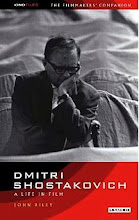Something I've been meaning to flag up for a while is Hitchcock's Blackmail at the Barbican, on Sunday 31 October at 8pm, with the BBC Symphony Orchestra performing a new score by Neil Brand. T his will be about the fourth score I'll have heard for it but if Neil Brand's past scores are anything to go by, it should be good.
his will be about the fourth score I'll have heard for it but if Neil Brand's past scores are anything to go by, it should be good.
 his will be about the fourth score I'll have heard for it but if Neil Brand's past scores are anything to go by, it should be good.
his will be about the fourth score I'll have heard for it but if Neil Brand's past scores are anything to go by, it should be good.Years ago (1993, a little research rather scarily tells me), I remember seeing Jonathan Lloyd's score which, after an initial flurry, doesn't seem to get done much any more. Perhaps the fact that the Lyons Corner House scene featured a set of variations on the (still-in-copyright) Tea for Two is a disincentive. Youmans comes out of copyright in 2016, so hang onto your hats...
Oddly enough I was only doing a session comparing the sound and silent versions a couple of weeks ago, so this will be an interesting addition to the mix.
Shamefully, you have to go to Germany to get a decent DVD of both the silent and sound versions of Blackmail [Erpressung] (even though it uses NFTVA material. It also turns up in a nice, but now, I see, quite expensive box called  Master of Suspense, though the selection of titles is a bit random: Champagne (1928), two Blackmails (1929), Murder (1930) and its German-language equivalent Mary [Mord - Sir John greift an] (1931), Rich and Strange (1931) Foreign Correspondent (1940), Suspicion (1941) and Under Capricorn (1949).
Master of Suspense, though the selection of titles is a bit random: Champagne (1928), two Blackmails (1929), Murder (1930) and its German-language equivalent Mary [Mord - Sir John greift an] (1931), Rich and Strange (1931) Foreign Correspondent (1940), Suspicion (1941) and Under Capricorn (1949).
 Master of Suspense, though the selection of titles is a bit random: Champagne (1928), two Blackmails (1929), Murder (1930) and its German-language equivalent Mary [Mord - Sir John greift an] (1931), Rich and Strange (1931) Foreign Correspondent (1940), Suspicion (1941) and Under Capricorn (1949).
Master of Suspense, though the selection of titles is a bit random: Champagne (1928), two Blackmails (1929), Murder (1930) and its German-language equivalent Mary [Mord - Sir John greift an] (1931), Rich and Strange (1931) Foreign Correspondent (1940), Suspicion (1941) and Under Capricorn (1949). Hopefully the BFI's Olympic project of restoring all nine of Hitchcock's surviving silents and commissioning new scores will bring forth a grand box to replace some of the less than satisfactory transfers that we currently labour under, perhaps (and this is mere speculation) including this new Blackmail score.
In the meantime, there's still a chance to donate to the restoration fund and, of course, to have one last look in the loft for that print of The Mountain Eagle!





